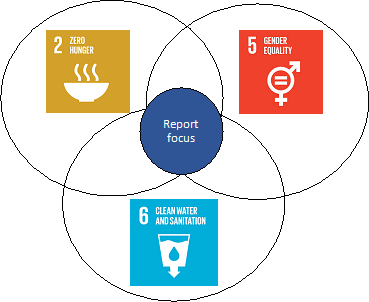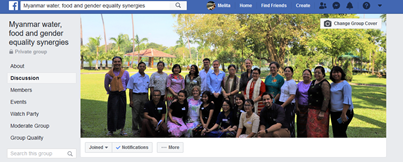Best Practices > Details
Linking Water, Food, and Gender Equality for Sustainability: Learnings from Myanmar
31/12/2019

This study is a part of a three-year project which was initiated in 2019. It is proposed to be conducted in three phases and is now in its final phase.
The study is result of a collaboration program between Australian Water Partnership (AWP) and the United Nations Food and Agriculture Organization (FAO) titled ‘Next Generation Agricultural Water Management for Asia Pacific’. The study aims to develop knowledge, capacity building, and guidance on the ways in which water management can be gender transformative while positively influencing the food security in Myanmar. In doing so, it supports three Sustainable Development Goals: Goal 2 (zero hunger), Goal 6 (water management), and Goal 5 (gender equality and empowerment of women and girls).

Despite being abundant in natural resources particularly in the form of water, Myanmar is one of the most vulnerable countries to climate change. While women always have and continue to play important roles in water resource management, access, and household food security, they remain marginalized from legal and political processes. Due to the interdependencies of food security, sustainable water management, and advancing gender equality and inclusion, developing strategies for improving gender equity in water and agriculture sectors require ways of working that support working across the different sectors and bring diversity of knowledge to the fore.
The study accomplishes these objectives by presenting some of the inseparable connections between water, food, and gender equality issues in Myanmar. It identifies methodologies for working at the nexus of three development domains. By doing so, it supports AWP and the partners to internalize gender equality and system thinking concepts into future projects that are aimed at supporting sustainable development against the backdrop of COVID-19 recovery in Myanmar. The study introduces novel ways of conducting research in an integrated way and thus reinforces the importance of transdisciplinary and participatory research and practice in the nexus study.
It identifies two participatory tools for this purpose. The first is co-production focused work, which helps to enable context specific, action oriented, and diverse knowledge generation processes. A simple use of this tool is during early stages of a project in Myanmar funded by AWP. Throughout the project, the (closed) platform will be used to spark conversations among participants across several countries, share materials, interact with partners, and provide project updates through Facebook, a commonly used platform in Myanmar.
In travel-restricted times, such as the one that was unfolded by COVID-19, or other reasons, remote ways to connect are needed in projects and research initiatives. The best way to determine how this is best done is to ask participants what methods of communication they prefer (phone, WhatsApp, email, Teams, teleconference, social media etc.) and to build on these preferred ways to engage so that the modes of communication that are familiar and inviting to participants.

The second tool is that of systems thinking methodologies which provide a series of tools that can be used in participatory settings to help identify linkage between sectors. The participatory approach in conducting a system thinking analysis is demonstrated through a workshop conducted during a workshop in Myanmar. Participants were asked to think and draw of situation relating to water, food, and/or gender in Myanmar that affected water, food, and gender security. The outputs from the participants allowed for a systemic linking of issues, for example, the link between women and their families in relation to sickness and health caused by toxic water from industry. This has enabled the support in identification of synergies and area of intervention that can help support the development of different sectors in parallel by involving the stakeholders in identifying root causes of the issues at hand.
The study is indicative of the inevitability of integrative and novel ways of conducting research in the nexus study in future. Transdisciplinary work, such as this, is reflexive, integrative, and method driven that aims to solve societal and scientific problems by differentiating and integrating knowledge from different disciplines. Through use of participatory tools, it proposes, the project sheds lights on the importance of context-based, pluralistic, goal-oriented, interactive, and holistic research and study.
